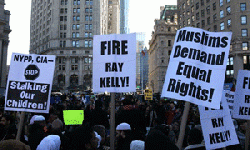In 2011, students in the Muslim Students’ Association (MSA) at Hunter College put up a sign in their club room, reading: “Please Refrain from Political Convos in the MSA”. The sole justification provided? An arrow pointing to a recent news article detailing the NYPD’s vast, secret surveillance program that spied on American Muslims.
A year and a half later, the NYPD maintains its disturbing defense: that police surveillance of American Muslims, though baseless, is harmless, and that those who have nothing to hide should have nothing to fear.
However, comprehensive interviews we conducted with American Muslims in New York relayed chilling firsthand accounts of how fear of surveillance suppressed religious practice, speech, political expression, and threatened to dissolve the very fabric of entire community.
For over a decade, the NYPD has dispatched undercover officers and informants into mosques, neighborhoods, businesses and college campuses across the New York City area and beyond, recording the minutia of American Muslim life. Officers reportedly collected information on how many times Muslim students prayed during their college whitewater rafting trip, which restaurants aired Al Jazeera television programming, what people chatted about after praying together – even the type of pizza a Muslim-owned pizzeria sold.
All that digging up gave them literally nothing. In August 2012, Thomas P Galati, chief of the Intelligence Division, admitted under oath that during his six-year tenure, the surveillance program had not yielded a single criminal lead. But the lack of leads did not mean the surveillance had no impact. Across New York City, American Muslims describe devastating consequences to their day-to-day lives.
And the stories abound.

|
| Muslim rights groups at Foley Square on February 3, 2011 protesting NYPD surveillance of Muslims in the city. PHOTO: Stephen Nessen/WNYC |
After one young man found out he unknowingly befriended an NYPD undercover officer at his mosque, he broke off all ties with anyone from that mosque and its larger community. Another young woman from Queens mused: “You look at your closest friends and ask: are they informants?”
A student at a City of University of New York campus was offered money and the promise of immigration benefits by two NYPD officers in exchange for working as an informant and perusing his friends’ Facebook pages. While he declined, he realized that his classmates might also have likely faced similar offers and might have not turned them down. And so now he assumes that informants are everywhere: “We have a huge student body. It’s impossible to know anyone.”
The result? Silence.
An imam in Brooklyn told us that his congregants urged him not to venture into discussions of social justice or promote call-outs for Trayvon Martin protests. “Let’s just talk about pilgrimage.” One hookah bar owner banned screening Al Jazeera news network. A young community organizer, who comes from a family of activists, described how his parents discouraged him from speaking out about surveillance. “This was the first time in my own family where safety trumped… the right thing to do.” Ironically, or perhaps, effectively, surveillance has muted dissent.
Muslim youth and students were among the most hard-hit. Rather than exploring their opinions and engaging with their peers, the way other college students do, they kept their head down and “lay low”. Several reported switching out of “political science” majors, in favor of “conventional” careers. One professor from Brooklyn College felt that “Muslim students are getting an inferior education because of this [surveillance], and that’s not fair.”
And kids are no longer kids. “I think twice before every time I put something on Facebook. I have to make sure it doesn’t give the wrong idea to law enforcement,” said a young woman from Queens. One student from Brooklyn College confessed, rather timidly, that he has stopped using the Arabic term for “bombshell” to talk about an attractive girl with his friends. He thought that would trigger all sorts of surveillance.
Many others were extremely cautious and told us their stories softly, and anonymously, behind closed doors. They were scared to simply tell their story, or to even mention the word “surveillance”. One young woman surmised, “Even if we know we have rights, we know they don’t apply equally to everyone.”
Unsurprisingly, many interviewees felt alienated from law enforcement. This worsened as New Yorkers learned that the NYPD was monitoring even its closest American Muslim partners, including imams who frequently appeared at the Mayor’s side.
As hate crimes against Muslims have made several headlines recently, the NYPD should implement policies to protect and support this large and diverse population of New York. Instead, by engaging in profiling practices, like surveillance and stop and frisk, the NYPD continues to stigmatize and alienate entire segments of New York’s population.
New York City is known for the diversity of its expressive, political, religious and communal life. American Muslims, who account for close to 10 percent of New Yorkers, are an inalienable part of the city’s makeup. The NYPD’s secret spying program and the city officials who defend seem blind to that reality.
Arastu and Shamas are co-authors of the report: Mapping Muslims: NYPD Spying and its Impact on American Muslims. From AlJazeera.






Leave a Reply